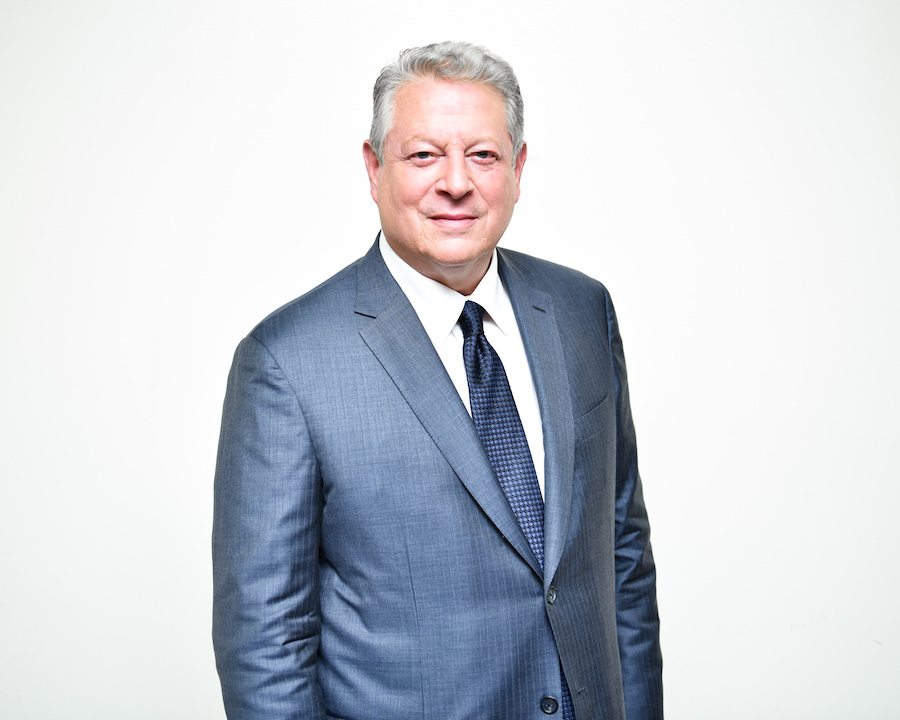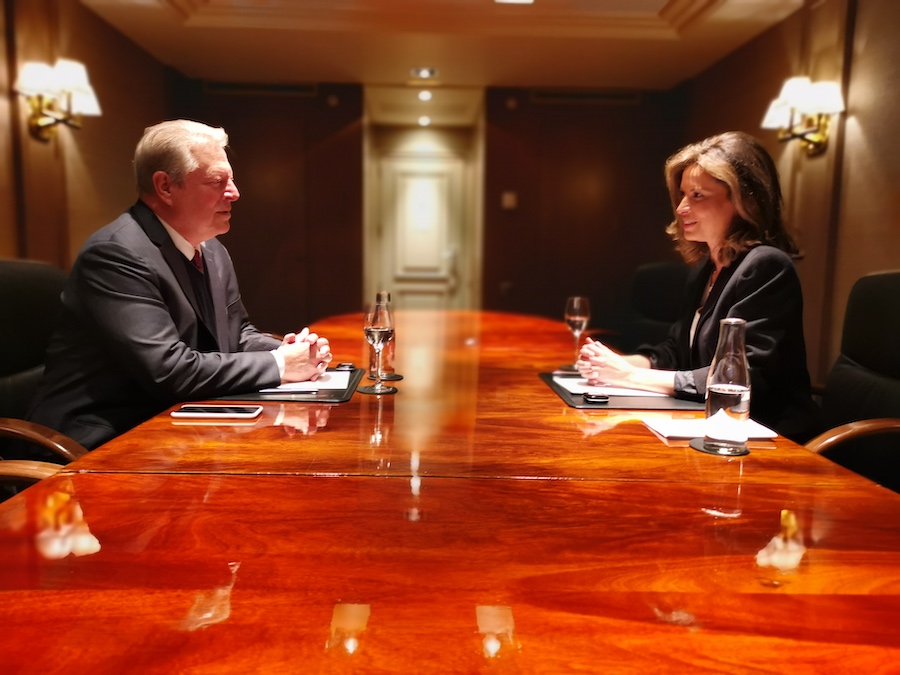The former vice president of the US government under Bill Clinton's administration, Al Gore (Washington D.C., 1948), is known worldwide for his efforts in the fight against human-caused global warming. In 2007 he received the Nobel Peace Prize as well as an Oscar for Best Documentary (2007) for the broadcasting of his speech "An Inconvenient Truth". Concern for global warming was something that had haunted him since his time as a congressman in 1976. As early as 1998, he had already proposed the launch of the Nasa DSCOVR satellite which became possible, years later, thanks to his efforts.
Author: Elena Cué

The former vice president of the US government under Bill Clinton's administration, Al Gore (Washington D.C., 1948), is known worldwide for his efforts in the fight against human-caused global warming. In 2007 he received the Nobel Peace Prize as well as an Oscar for Best Documentary (2007) for the broadcasting of his speech "An Inconvenient Truth". Concern for global warming was something that had haunted him since his time as a congressman in 1976. As early as 1998, he had already proposed the launch of the Nasa DSCOVR satellite which became possible, years later, thanks to his efforts. Although he beat George W. Bush in popular votes, he lost the 2000 presidential election he ran for as the Democratic Party's candidate. Al Gore, Prince of Asturias Award (2007), is also the political father of the Internet. In 1978 he coined the term "Information Superhighway" and in 1991, as vice president in the Clinton administration, he created the National Information Infrastructure (NII) on which the Internet was developed. Gore is a visionary who knew how to solve the human need for interconnection. Once this challenge was overcome, he migrated from technological activism to environmental activism, from human interconnection to the survival of our planet.
You have experience advocating against climate change both in government and now in your foundation "The Climate Reality Project". In your opinion, where is your work most effective?
There is no position with as much influence as the position of president. That said, when I was not able to become president, I felt grateful to have the opportunity to influence in other ways. Ultimately, the solutions to the climate crisis must come from changed government policies. That would be the most influential way to go about it. However, in order to persuade governments to change, there is a place for advocates in the private sector and I am happy to be able to advocate for the right solutions.
If you were currently in government, what steps would you take in your country to help reverse climate change?
Number one, I would eliminate all government subsidies for fossil fuels. Number two, I would put a price on carbon, which would require action by the congress as well, but I believe it is now time to test the support for that measure, because I think it is there. Number three, I would accelerate the phase out of internal combustion vehicles such as cars and trucks and replace them with electric vehicles. Next, I would encourage regenerative agriculture to sequester more carbon in the top soil and plant as many trees as possible. Finally, I would launch a major program to make all buildings and factories much more efficient, with better insulation, windows, lighting and much higher levels of efficiency.
The United States is currently the second biggest polluter after China.
Yes. China is first and the US is second.
More than 90 percent of scientists consider that the greenhouse effect is anthropogenic. What would your strongest argument be to convince those who deny climate change exists?
First of all, it is now 99% of scientists. It is also Mother Nature itself whose arguments come in the form of hurricanes, floods, draughts and other consequences of the climate crisis which makes what scientists have been telling us for decades simply indisputable. If they are still deniers after all this time, I don’t know what might convince them. There are still people who believe the landing on the moon was a hoax. There are still people who believe that the Earth is flat. It is pointless to waste time arguing with such people.
How do the interests of dirty-energy (fossil fuel energy) companies affect the solution of the problem?
Some of the fossil fuel energy companies, especially in the US, have been using unethical strategies to slow down the solutions to the climate crisis. They have been doing the same thing that tobacco companies have been doing for so many years: putting information out to the public that is false and inaccurate. Tobacco companies hired actors, dressed them up as doctors and put them on television to lie to the public and tell them there were no health problems with cigarettes. Some of the fossil fuel companies, especially in my country, have been doing the same thing. They spend a lot of money to give the public misleading and false information about the climate crisis. They tell people that it does not exist, that it is exaggerated, that it is not a serious problem. President Trump is one of the biggest violators. He is supported by these fossil fuels companies precisely because he is willing to lie to people about the climate crisis.
What does it mean to you to receive the Nobel Peace Prize (2007) for your activism in favor of the theory of Climate Change?
The most important meaning is that it gives me a better opportunity to convince people that we have to change. It was the greatest honor of my life, along with the Prince of Asturias award. Both of these prestigious awards are important to me, not for personal pride, but because it gives me a better chance to gain an audience.
What are the main contributions of the COP25 World Climate Summit in Madrid? Have there been any significant advances?
Not yet, but usually the advances come on the final day of such conferences so I am hopeful they will break the impasse that currently exists at the conference center, where I spoke this morning. I hope they will be able to prepare the blueprint for next year’s meeting in Glasgow where all 195 nations will be asked to make bolder commitments to reduce their global warming pollution.
Does reaching an agreement between nations signify success even if not all countries are committed to it?
When the entire world reaches an agreement, that agreement inevitably puts a lot of pressure on all nations to do their absolute best to comply. It also puts a lot of pressure on private businesses, banks and investors. In some ways, business leaders are making more progress than political leaders. The reason for this is that the customers of these very businesses are telling them that they want to do business with companies that are part of the effort to solve the climate crisis.
Your documentary "An Inconvenient Sequel: Truth to Power" covers the dilemma presented by countries like India, that need to burn fossil fuels in order to generate the energy needed to develop its industry, infrastructure and to increase the well-being of its population. As a solution, you advised them to increase their investment in renewable energies. Has there been any progress since the Paris Summit?
Yes, there has been fantastic progress in India. The country has experienced a big change since the Paris conference. They have started building massive solar and wind farms. Their electricity prices are going down. The air is no longer as dirty because of burning coal although they have other sources of dirty air that they still have a real problem dealing with. However, their commitment to solar energy is helping them build a better future.
In a climate emergency situation, like the one we are in at the moment, what impact do the Amazon wildfires have?
The new president of Brazil, Balsanaro, is responsible for no longer enforcing the environmental protections that have limited the burning of the Amazon. He is giving a green light and it has resulted in a much more fires. The risk is that the Amazon will be picked apart and will lose its ecological integrity. Scientists are now very worried that it will flip into a different ecosystem. Instead of being a forest it may become a savanna. If that happens, it will no longer absorb as much CO2 so it will make the global problem worse.
As the Amazon belongs to Brazil, how can we balance taking care of the world’s lungs with the demands of a growing population that has its own needs?
Destroying the Amazon is not a solution to poverty. It is simply a mistake and an ecological travesty. One reason it is a mistake is that the soil in the Amazon is extremely thin and it will not support agriculture for long. What we are seeing is a lot of corruption with people destroying the Amazon, making a quick profit and then abandoning it soon after. The way to create prosperity and more jobs is to accelerate the shift to solar and wind energy and sustainability as a blueprint. That can actually create more jobs and more wealth in Brazil than could ever be done by simply burning down the rainforest. In addition, it is important to remember that in the twenty-first century one of the most valuable resources is the unique pull of generic information that is in the rainforest. Cures for cancer and other diseases are often found in the exotic forms of life that exist in more abundance in the Amazon than anywhere else on Earth. It is foolish to destroy all of this genetic knowledge without even cataloging it and trying to use this information for its great value in medicine and in the making of new materials.
The overall notion seems to be that the development of new technologies, such as solar and wind energy, is slowing down but your stance is different to that. Could you explain why you are optimistic about it?
Many people are surprised when they see the latest business statistics. Electricity from the sun is now the cheapest source of electricity. The second cheapest source is electricity from wind. It is actually not that uncommon for people to be surprised when a brand new technology develops quickly. It is now a repeated pattern in the modern world where all of a sudden our mobile phones, for example, become supercomputers. They become everything; they can even act as flashlights. You can pay your bills with them. There are many other examples of these new technologies that at first are expensive and awkward but then they go down in cost and become much more sophisticated. This is what has happened with solar and wind energy. Those who have not been a part of that industry, after a few years pass, they see the new reforms and are very surprised but the business people who keep track of this are not surprised. They have been expecting this and they have been investing in it. Now, these new forms of energy are radically changing the energy marketplace worldwide.
The technology for storing solar energy has also advanced.
That is exactly right. In addition to the fantastic improvements in the technology for solar and wind, there is now also a fantastic improvement in the technology of batteries that can store the electricity so that you can use solar energy at night and wind energy when the wind is not blowing. The cost of these batteries has also been going down very rapidly.
And how about here in Spain?
There is less use of batteries in Spain than in most other advanced countries. I am not quite sure why that is the case but I think that will soon change. By the way, Spain has one of the most fantastic resources for solar energy than any other nation in the world. Particularly in the southern half of Spain. The development of batteries along with solar energy can transform the energy markets in Spain and sharply reduce the price of electricity making all businesses in Spain more competitive.
Regarding radioactive materials, do you think the nuclear waste management can be done in a safe manner?
Yes, I do, but nuclear energy, in its present form, is the most expensive source of electricity that we have. It is being phased out in most countries. China is still building a few new reactors but most countries are not, mainly because it is so expensive. There are two other problems. The handling of nuclear waste can probably be done safely but it also adds to the cost. Utility companies are paying money into a fund that is supposed to be used for the careful storage for nuclear waste but it is going to require even more money if there are more reactors built. Another problem is that the experience and knowledge necessary to manage nuclear plants has been hollowed out. The graduate schools that train nuclear engineers have not been training many nuclear engineers because after Chernobyl and Fukushima Daiichi the acceptability of nuclear energy was damaged in the minds of the public. Germany, for example, cancelled its nuclear plan.
When Alliance 90 (The Greens) entered the German government, Germany reduced its nuclear plants by twenty percent but in return increased its fossil fuel production. Now Germany is one of the biggest polluters in Europe...
The answer is not to go from nuclear to coal and gas, but to go from nuclear to solar, wind and batteries.
Given the current climate change emergency and the fact that nuclear power plants do not polute the atmosphere, should we consider nuclear power as a temporary solution to the urgent need to reduce emissions?
Most of the business leaders in the utility industry have become discouraged about nuclear energy. If you are the CEO of a utility company making and selling electricity and you decided to build a new nuclear plant, you would consult your staff and ask questions. One of the questions you would ask is how much it would cost to build a new nuclear plant. The truth is there is not a single consulting engineer in Europe or North America who will give you an answer to that question. No one can tell you how much it will cost. A second question you might ask is how many years it would take before the nuclear plant is finished so you can start using it to make electricity. There too, no one can give you an answer to that question. It is discouraging if you do not know how much it would cost or how long it will take to build. The utility company’s CEO would say that he/she does not want something with that much cost, uncertainty and trouble. That is what has been happening and it is happening in Spain as well. You have some nuclear plants here that are 40 years old and they keep getting 5-year extensions. They actually do provide about 20% of your electricity. I could be wrong, but I think that is about right. They do play a valuable role but the future of nuclear power does not look very good unless innovators come up with a new kind of nuclear plant that is less expensive and safer to operate.
What is your opinion of the Swedish activist Greta Thunberg?
I think she is fantastic. I am a big supporter of Greta. I met her a year ago in Poland at the United Nations Climate Change Conference. I greatly admire her ability to speak truth to people in power. I think she is a remarkable young woman and I am her biggest fan.

Al Gore during his interview with Elena Cué
- Interview with Al Gore - - Alejandra de Argos -



